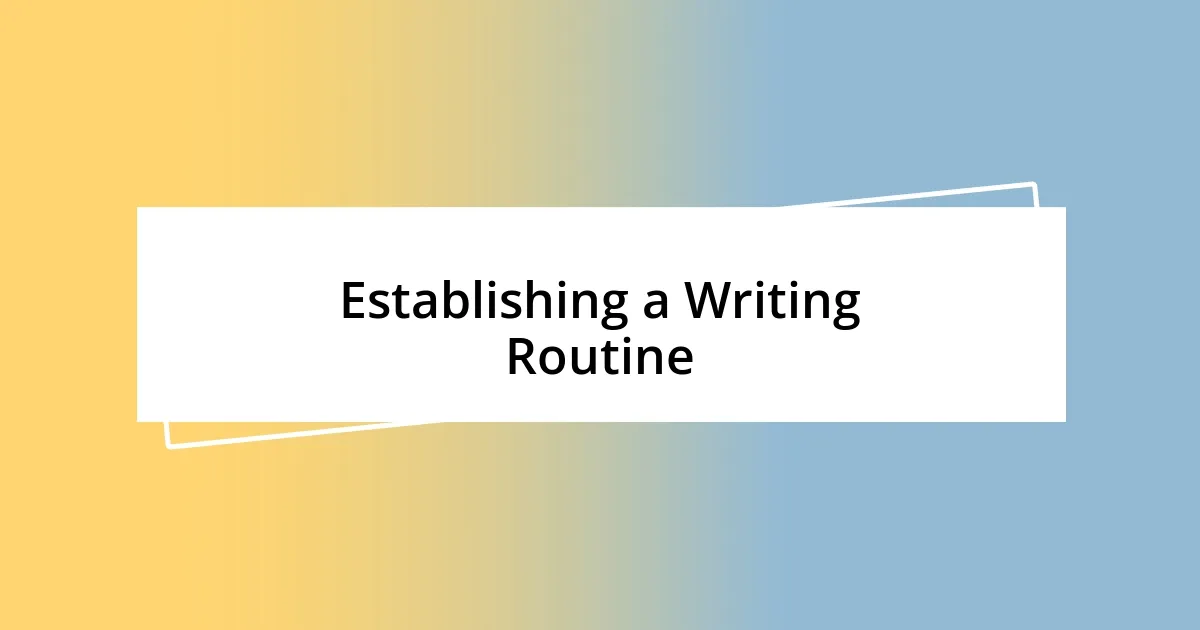Key takeaways:
- Finding your personal “why” is crucial for maintaining motivation in writing, as it provides clarity and passion.
- Setting achievable, specific goals can enhance focus and confidence, while embracing flexibility helps adapt to life’s unpredictability.
- Creating a dedicated writing space and establishing a writing routine fosters creativity and consistent productivity.
- Celebrating small wins reinforces progress and can transform the writing process into an enjoyable journey rather than a daunting task.

Finding Your Personal Why
Finding your personal “why” is essential for staying motivated to write. For me, it’s about the deep connection I have with storytelling. I still remember the moment I finished my first story as a child; my heart raced with excitement, and I realized that there was power in my words. Can you think of a time when your writing moved you or others in a profound way?
Reflecting on my “why” has helped me navigate the peaks and valleys of my writing journey. When I hit a roadblock, I often ask myself, “What do I hope to achieve with my words?” This simple question brings clarity and reignites my passion. It’s like shining a flashlight in a dark room—once I find the light, everything becomes clearer, and I can see the path ahead.
Additionally, I find that my reasons for writing evolve as I grow. At first, it was about sharing my dreams; now it’s about inspiring others to find their voices as well. Have you noticed how your motives shift over time? Embracing these changes reminds me that my journey is just as important as the end product.

Setting Achievable Goals
Setting achievable goals plays a crucial role in my writing journey. I recall when I set a goal to write just 500 words a day. Initially, it felt daunting, but as I broke it down into smaller tasks—like focusing on a single paragraph—my confidence soared. Have you ever noticed how accomplishing a little can motivate you to achieve more? Each small win became a stepping stone, leading to bigger achievements.
It’s fascinating how setting specific, measurable goals can transform my approach to writing. For instance, I once aimed to finish a short story by the end of the month. I mapped out my daily writing sessions, and by staying accountable, I ended up completing it two weeks early! This experience taught me that having clear targets not only keeps me focused but also adds a layer of excitement to my writing process. What writing milestones have you set for yourself?
To ensure my goals remain achievable, I’ve learned to embrace flexibility. Life can be unpredictable, which means I often need to adjust my timelines. Recently, I had to pause a writing project due to personal commitments. Instead of getting discouraged, I simply shifted my focus to smaller writing exercises during that time. This adaptability not only kept my creativity flowing but allowed me to approach my projects with renewed energy. Have you ever had to readjust your writing goals? How did that experience shape your journey?
| Goal Type | Description |
|---|---|
| Short-term Goals | These targets are specific and can be achieved quickly, such as writing daily word counts or completing a chapter in a week. |
| Long-term Goals | These are broader objectives, like finishing a novel or getting published, often taking months or years to accomplish. |

Creating a Dedicated Writing Space
Creating a dedicated writing space has been a game changer for me. I remember when I first transformed a corner of my bedroom into a little nook just for writing. It was a simple setup—just a desk, a comfy chair, and my favorite books on the shelf—but walking into that space instantly sparked creativity. I often feel that the energy of the room shifts, encouraging my thoughts to flow freely. Have you ever experienced how the ambiance can impact your writing mood?
Here are some essential elements to consider when establishing your own writing space:
- Comfortable seating: A good chair makes long writing sessions more enjoyable.
- Proper lighting: Natural light is my preference; it keeps me alert and inspired.
- Personal touches: Include items that motivate you, like photos or quotes that resonate with your journey.
- Minimized distractions: Keep your space tidy and limit anything that could divert your focus.
- Soundscapes: I often play soft music or ambient sounds in the background, creating an atmosphere conducive to writing.
Establishing these elements not only makes my writing time enjoyable but also means I associate that space with creativity and productivity. Whenever I sit down to write, I’m ready for the ideas to come pouring out!

Establishing a Writing Routine
Establishing a writing routine has been pivotal in maintaining my motivation. I’ve found that consistency can be just as important as inspiration. When I committed to writing every morning right after breakfast, it felt less like a chore and more like a refreshing ritual. Have you ever tried pairing a habit with an existing routine? I bet you’ll find it makes the process much smoother.
One of my favorite practices is to set a timer for thirty minutes and dive into writing without interruptions. This approach reminds me of my school days when exams caused excitement mixed with pressure. As the timer ticks down, I can feel that surge of adrenaline pushing my creativity. Do you recall a time when a deadline inspired your best work? It’s fascinating how a little urgency can unlock hidden potential!
I also appreciate the beauty of endings, as I treat my writing sessions like chapters in a story. When I finish a session, I take a moment to reflect on my progress—sometimes jotting down a thought or two about what went well. This brief pause feels like a mini-celebration and keeps me excited for the next session. How do you celebrate your writing achievements, however small? Recognizing your efforts, no matter the size, can certainly build that momentum needed to write more!

Using Accountability Partners
Having accountability partners has transformed my writing journey in ways I never expected. I recall a time when I felt overwhelmed by my writing goals; that’s when I reached out to a fellow writer. We agreed to check in with each other weekly to discuss our progress. The simple act of sharing my goals made them feel more tangible and motivated me to stay on track. Can you remember a time when someone else’s encouragement pushed you to accomplish something you thought was out of reach?
In our weekly meetings, we not only shared what we wrote but also our struggles. This openness created a safe space where I felt supported and understood. There were moments when sticking to my writing schedule felt impossible, and my partner reminded me of my passion for storytelling. This camaraderie keeps me accountable, making sure I show up for both myself and my partner. Have you ever found that having someone rooting for you makes a difference in your determination to succeed?
Using accountability partners also helps me celebrate milestones, big and small. When I complete a piece or reach a word count goal, we take a moment to acknowledge those wins together. This practice not only reinforces our commitments but also injects joy into the writing process. I truly appreciate having someone who understands my journey—it’s invigorating to share that sense of accomplishment with someone who genuinely cares. So, what’s stopping you from finding an accountability partner? It could be the key to unlocking your fullest writing potential!

Embracing Feedback and Revision
Embracing feedback and revision is one of the most crucial parts of my writing journey. I remember receiving my first round of feedback on a short story; the honesty and constructive criticism stung, but it ultimately opened my eyes to new possibilities. Each comment I read felt like a puzzle piece that could transform my work into something extraordinary. Don’t you find that feedback, while initially intimidating, can serve as motivation to elevate your writing?
Revision, for me, is a dance between creativity and critical thinking. Early on, I approached my drafts with an emotional attachment that made revising feel like a betrayal. Over time, I learned to separate my identity as a writer from my work. Now, when I revise, I dive in with a sense of curiosity, asking myself, “How can I make this stronger or clearer?” This mindset shift has not only fueled my motivation but also made the process feel like an exciting challenge rather than a daunting task. Have you experienced a similar transformation when embracing the revision process?
The satisfaction of seeing an idea evolve through several drafts continually inspires me. I recall reworking a poem after various rounds of feedback, where I almost didn’t recognize the final piece from its original form. Each revision brought me closer to capturing the emotion I aimed to convey. It’s such a thrill to polish a piece until it shines, resonating with not just me, but also my readers. What if the next draft you tackle could unlock your true voice? Why not give it a go and see where the revisions take you?

Celebrating Small Wins
Celebrating small wins has become an essential practice in my writing routine. I vividly remember the first time I completed a chapter. I felt this rush of pride that made me want to jump up and do a little dance! Recognizing that moment not only boosted my confidence but also re-energized my writing momentum. Have you ever experienced that wave of joy simply from reaching a small goal? It’s a powerful feeling, isn’t it?
I often create little rituals to mark these achievements, whether it’s treating myself to a favorite snack or pausing to savor a cup of coffee while reflecting on my progress. These small celebrations remind me that every step counts, not just the finish line. It’s easy to overlook these victories in the hustle of writing, but taking the time to appreciate them helps me stay grounded and motivated. What would it look like for you to honor your accomplishments, even the tiny ones?
Incorporating celebrations into my routine has transformed my relationship with writing. Instead of viewing it as a daunting task, I now see it as a series of victories to relish. Recently, I finished a rough draft that felt like an uphill battle. Instead of fixating on how much work was left, I took a moment to celebrate the fact that I had pushed through the tough parts. That shift in focus made all the difference. How might you redefine your writing journey by choosing to celebrate your progress?














